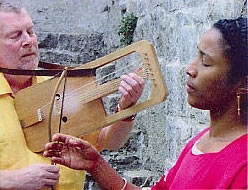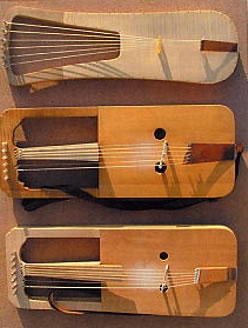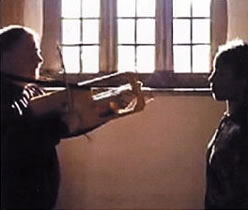The crwth is the ancient lyre of Northern Europe modified by the addition of a fingerboard and the application of the bow. It was played in France, England, Ireland, Scotland, and Wales, where it survived longest, and where it was used from the 10th century to the end of the 16th century to accompany classical or bardic poetry (cerdd dafod) with unique Welsh string music (cerdd dant). The music, like the poetry, was composed upon rigorous and conservative principles. The poets, instrumentalists and singers were part of an all-embracing bardic system. During the early-17th century the crwth lost its prestige as the bardic system was abandoned and players provided new, European-style, music until the crwth fell out of use in the late-18th century. Bragod contrasts examples of this new music with the old. The duo's key to Welsh medieval music is the Robert ap Huw Manuscript, (The British Library, Robert ap Huw, MUSICA, Additional 14905). Robert Evans' research into this manuscript is of pivotal importance and is the basis of Bragod's work. He is responsible for the revival of the crwth as a viable historical instrument, drawing on Welsh theoretical treatises and years of experiment on the setting up of the instrument and its playing technique.
Bragod draws freely on the sound world revealed by their medieval experiments in their performance of later popular and ritual music. Mary-Anne Roberts has evolved a striking voice production which combines with the close harmonies and the buzzing tone of the crwth. This combination intensifies strong overtones and difference tones which are further augmented by Bragod's commitment to Pythagorean tuning. They have given recitals and lecture/recitals at concert venues and academic conferences in Wales, England, Rajasthan and Sardinia and are often called upon to provide ritual music by their local community. Bragod have presented their material to infants, school children, and formally, to university students. They have been featured on Welsh television and radio stations and the BBC World Service. Their first CD - 'Bragod', and their new CD - 'Kaingk', are played regularly on Late Junction, BBC Radio 3 and Radio Tre Italia. They have made live broadcasts on BBC Radio 3. Bragod may be booked for concerts, lecture/recitals, work in schools, festivals, workshops and celebrations. |
||||||||||||
|
||||||||||||

 Bragod
is the only musical ensemble dedicated to exploring the performance
of medieval and renaissance Welsh music and poetry in an historically-informed
way. They sing Welsh poetry ranging from stanzas of the Gododdin
(6th century) to ritual and popular songs of the 18th and 19th
century. They play the six-stringed lyre of 6th century Northern
Europe and the crwth. They play and sing in Pythagorean tuning.
Bragod
is the only musical ensemble dedicated to exploring the performance
of medieval and renaissance Welsh music and poetry in an historically-informed
way. They sing Welsh poetry ranging from stanzas of the Gododdin
(6th century) to ritual and popular songs of the 18th and 19th
century. They play the six-stringed lyre of 6th century Northern
Europe and the crwth. They play and sing in Pythagorean tuning.  In
the Summer of 2002 Bragod gave the first modern performance of
Ystorya Trystan,The Welsh Tristan Story, part of the Arthurian
epic. Since no music survives for this largely 12th century text,
they have composed new music, drawing on medieval Welsh and European
musical treatises. In 2003 they set stanzas from The Book of Aneirin
(6th century) to new music, composed using a reconstructed 6th
century lyre, drawing on the musical ideas of classical and later
periods.
In
the Summer of 2002 Bragod gave the first modern performance of
Ystorya Trystan,The Welsh Tristan Story, part of the Arthurian
epic. Since no music survives for this largely 12th century text,
they have composed new music, drawing on medieval Welsh and European
musical treatises. In 2003 they set stanzas from The Book of Aneirin
(6th century) to new music, composed using a reconstructed 6th
century lyre, drawing on the musical ideas of classical and later
periods. 

